英语教学法论文
英语教学的论文
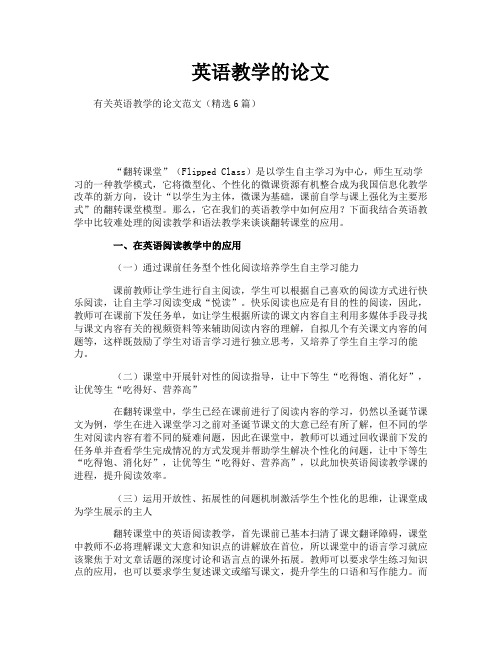
英语教学的论文有关英语教学的论文范文(精选6篇)“翻转课堂”(Flipped Class)是以学生自主学习为中心,师生互动学习的一种教学模式,它将微型化、个性化的微课资源有机整合成为我国信息化教学改革的新方向,设计“以学生为主体,微课为基础,课前自学与课上强化为主要形式”的翻转课堂模型。
那么,它在我们的英语教学中如何应用?下面我结合英语教学中比较难处理的阅读教学和语法教学来谈谈翻转课堂的应用。
一、在英语阅读教学中的应用(一)通过课前任务型个性化阅读培养学生自主学习能力课前教师让学生进行自主阅读,学生可以根据自己喜欢的阅读方式进行快乐阅读,让自主学习阅读变成“悦读”。
快乐阅读也应是有目的性的阅读,因此,教师可在课前下发任务单,如让学生根据所读的课文内容自主利用多媒体手段寻找与课文内容有关的视频资料等来辅助阅读内容的理解,自拟几个有关课文内容的问题等,这样既鼓励了学生对语言学习进行独立思考,又培养了学生自主学习的能力。
(二)课堂中开展针对性的阅读指导,让中下等生“吃得饱、消化好”,让优等生“吃得好、营养高”在翻转课堂中,学生已经在课前进行了阅读内容的学习,仍然以圣诞节课文为例,学生在进入课堂学习之前对圣诞节课文的大意已经有所了解,但不同的学生对阅读内容有着不同的疑难问题,因此在课堂中,教师可以通过回收课前下发的任务单并查看学生完成情况的方式发现并帮助学生解决个性化的问题,让中下等生“吃得饱、消化好”,让优等生“吃得好、营养高”,以此加快英语阅读教学课的进程,提升阅读效率。
(三)运用开放性、拓展性的问题机制激活学生个性化的思维,让课堂成为学生展示的主人翻转课堂中的英语阅读教学,首先课前已基本扫清了课文翻译障碍,课堂中教师不必将理解课文大意和知识点的讲解放在首位,所以课堂中的语言学习就应该聚焦于对文章话题的深度讨论和语言点的课外拓展。
教师可以要求学生练习知识点的应用,也可以要求学生复述课文或缩写课文,提升学生的口语和写作能力。
中学英语教学论文优秀6篇
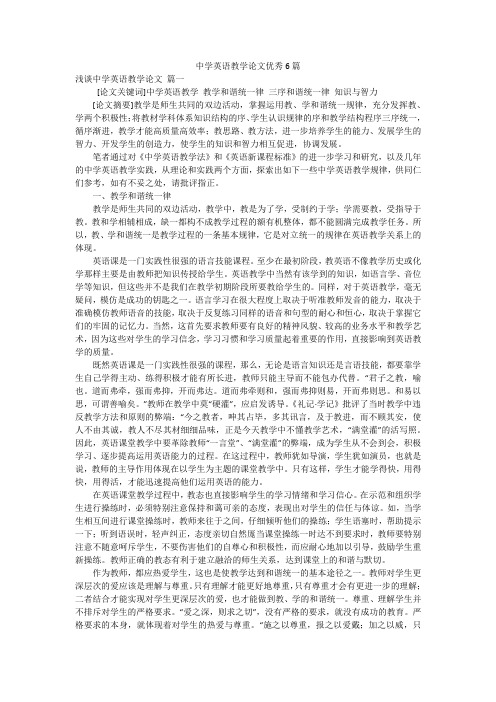
中学英语教学论文优秀6篇浅谈中学英语教学论文篇一[论文关键词]中学英语教学教学和谐统一律三序和谐统一律知识与智力[论文摘要]教学是师生共同的双边活动,掌握运用教、学和谐统一规律,充分发挥教、学两个积极性;将教材学科体系知识结构的序、学生认识规律的序和教学结构程序三序统一,循序渐进,教学才能高质量高效率;教思路、教方法,进一步培养学生的能力、发展学生的智力、开发学生的创造力,使学生的知识和智力相互促进,协调发展。
笔者通过对《中学英语教学法》和《英语新课程标准》的进一步学习和研究,以及几年的中学英语教学实践,从理论和实践两个方面,探索出如下一些中学英语教学规律,供同仁们参考,如有不妥之处,请批评指正。
一、教学和谐统一律教学是师生共同的双边活动,教学中,教是为了学,受制约于学;学需要教,受指导于教。
教和学相辅相成,缺一都构不成教学过程的额有机整体,都不能圆满完成教学任务。
所以,教、学和谐统一是教学过程的一条基本规律,它是对立统一的规律在英语教学关系上的体现。
英语课是一门实践性很强的语言技能课程。
至少在最初阶段,教英语不像教学历史或化学那样主要是由教师把知识传授给学生。
英语教学中当然有该学到的知识,如语言学、音位学等知识,但这些并不是我们在教学初期阶段所要教给学生的。
同样,对于英语教学,毫无疑问,模仿是成功的钥匙之一。
语言学习在很大程度上取决于听准教师发音的能力,取决于准确模仿教师语音的技能,取决于反复练习同样的语音和句型的耐心和恒心,取决于掌握它们的牢固的记忆力。
当然,这首先要求教师要有良好的精神风貌、较高的业务水平和教学艺术,因为这些对学生的学习信念,学习习惯和学习质量起着重要的作用,直接影响到英语教学的质量。
既然英语课是一门实践性很强的课程,那么,无论是语言知识还是言语技能,都要靠学生自己学得主动、练得积极才能有所长进,教师只能主导而不能包办代替。
“君子之教,喻也。
道而弗牵,强而弗抑,开而弗达。
道而弗牵则和,强而弗抑则易,开而弗则思。
英语教学方法论文
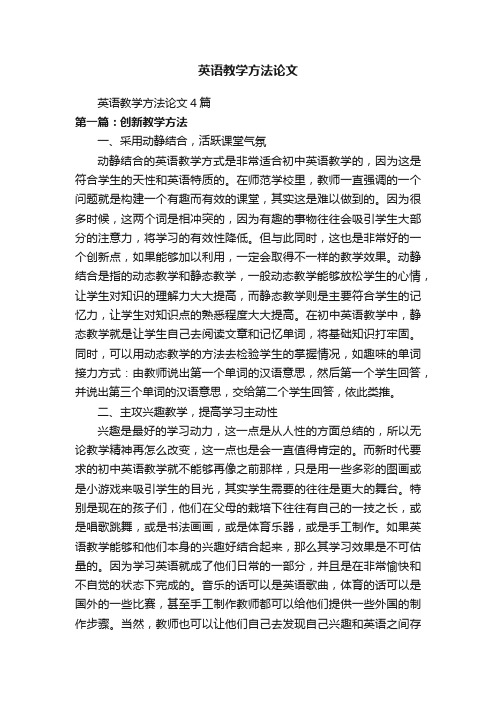
英语教学方法论文英语教学方法论文4篇第一篇:创新教学方法一、采用动静结合,活跃课堂气氛动静结合的英语教学方式是非常适合初中英语教学的,因为这是符合学生的天性和英语特质的。
在师范学校里,教师一直强调的一个问题就是构建一个有趣而有效的课堂,其实这是难以做到的。
因为很多时候,这两个词是相冲突的,因为有趣的事物往往会吸引学生大部分的注意力,将学习的有效性降低。
但与此同时,这也是非常好的一个创新点,如果能够加以利用,一定会取得不一样的教学效果。
动静结合是指的动态教学和静态教学,一般动态教学能够放松学生的心情,让学生对知识的理解力大大提高,而静态教学则是主要符合学生的记忆力,让学生对知识点的熟悉程度大大提高。
在初中英语教学中,静态教学就是让学生自己去阅读文章和记忆单词,将基础知识打牢固。
同时,可以用动态教学的方法去检验学生的掌握情况,如趣味的单词接力方式:由教师说出第一个单词的汉语意思,然后第一个学生回答,并说出第三个单词的汉语意思,交给第二个学生回答,依此类推。
二、主攻兴趣教学,提高学习主动性兴趣是最好的学习动力,这一点是从人性的方面总结的,所以无论教学精神再怎么改变,这一点也是会一直值得肯定的。
而新时代要求的初中英语教学就不能够再像之前那样,只是用一些多彩的图画或是小游戏来吸引学生的目光,其实学生需要的往往是更大的舞台。
特别是现在的孩子们,他们在父母的栽培下往往有自己的一技之长,或是唱歌跳舞,或是书法画画,或是体育乐器,或是手工制作。
如果英语教学能够和他们本身的兴趣好结合起来,那么其学习效果是不可估量的。
因为学习英语就成了他们日常的一部分,并且是在非常愉快和不自觉的状态下完成的。
音乐的话可以是英语歌曲,体育的话可以是国外的一些比赛,甚至手工制作教师都可以给他们提供一些外国的制作步骤。
当然,教师也可以让他们自己去发现自己兴趣和英语之间存在的微妙的关系,并且作为课堂作业向展示。
三、结合时代气息,采用科技教学时代发展迅速,教育也在发生着日新月异的变化,初中英语教学就应该乘着这股东风“扶摇直上”,采用与时代科技相结合的方式去进行创新教学。
小学英语论文小学英语教学论文10篇优秀9篇
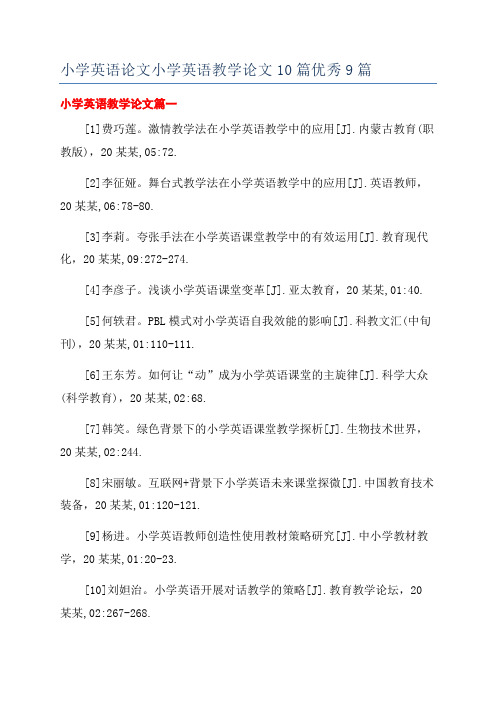
小学英语论文小学英语教学论文10篇优秀9篇小学英语教学论文篇一[1]费巧莲。
激情教学法在小学英语教学中的应用[J].内蒙古教育(职教版),20某某,05:72.[2]李征娅。
舞台式教学法在小学英语教学中的应用[J].英语教师,20某某,06:78-80.[3]李莉。
夸张手法在小学英语课堂教学中的有效运用[J].教育现代化,20某某,09:272-274.[4]李彦子。
浅谈小学英语课堂变革[J].亚太教育,20某某,01:40.[5]何轶君。
PBL模式对小学英语自我效能的影响[J].科教文汇(中旬刊),20某某,01:110-111.[6]王东芳。
如何让“动”成为小学英语课堂的主旋律[J].科学大众(科学教育),20某某,02:68.[7]韩笑。
绿色背景下的小学英语课堂教学探析[J].生物技术世界,20某某,02:244.[8]宋丽敏。
互联网+背景下小学英语未来课堂探微[J].中国教育技术装备,20某某,01:120-121.[9]杨进。
小学英语教师创造性使用教材策略研究[J].中小学教材教学,20某某,01:20-23.[10]刘妲治。
小学英语开展对话教学的策略[J].教育教学论坛,20某某,02:267-268.[11]路亚涵。
浅谈小学英语教育中的创造教育[J].教育现代化,20某某,01:228-229.[12]完玛草。
自然拼读法在小学英语教学中的应用[J].西部素质教育,20某某,04:179.[13]王秀国。
小学英语课外阅读习惯的养成分析[J].西部素质教育,20某某,02:166.[14]王思佳。
思维导图在小学英语词汇教学中的应用[J].读与写(教育教学刊),20某某,01:101+112.[15]刘思瑶。
故事教学法在小学英语教学中的应用[J].黑龙江教育(理论与实践),20某某,03:56-57.[16]王凤英。
浅谈小学英语两级分化的成因以及改进方法[J].才智,20某某,04:193.[17]沈丽萍。
高中英语教学论文8篇
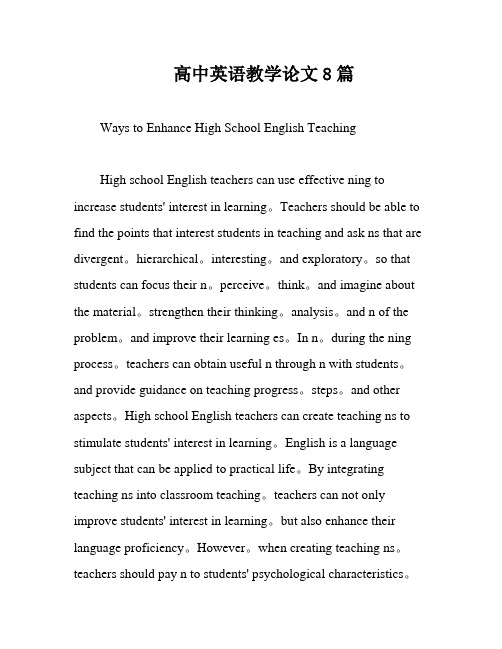
高中英语教学论文8篇Ways to Enhance High School English TeachingHigh school English teachers can use effective ning to increase students' interest in learning。
Teachers should be able to find the points that interest students in teaching and ask ns that are divergent。
hierarchical。
interesting。
and exploratory。
so that students can focus their n。
perceive。
think。
and imagine about the material。
strengthen their thinking。
analysis。
and n of the problem。
and improve their learning es。
In n。
during the ning process。
teachers can obtain useful n through n with students。
and provide guidance on teaching progress。
steps。
and other aspects。
High school English teachers can create teaching ns to stimulate students' interest in learning。
English is a language subject that can be applied to practical life。
By integrating teaching ns into classroom teaching。
大学英语教学论文(9篇)_英语论文

大学英语教学论文(9篇)_英语论文第一篇:独立学院大学英语教学ESP理论应用一、引言独立学院以培养符合社会和市场需求的应用型人才为目标,在我国高等教育大众化发展现阶段,独立学院面临着空前挑战和激烈竞争。
大学英语是规模最大的基础课程,近年来各独立学院纷纷进行大学英语改革,如分级教学、模块教学、翻转课堂等。
改革在一定程度上提高了学生的英语水平,但目前独立学院大学英语以一般用途英语(EnglishforGeneralPur-pose)为主,虽然强调提高学生听、说、读、写、译技能,但实际上主要目标是提高学生的应试能力,尤其是通过全国大学英语四六级考试的能力。
因此,不足以满足学生毕业后对英语的日常和工作需求,未能很好地实现独立学院培养应用型人才这一目标。
专门用途英语,即ESP(EnglishforSpecificPurposes),是近年来外语教育界研究的热点之一,尤其受到独立学院英语教师们的关注。
在EGP的基础上,ESP不但适合我国现阶段英语教学发展要求,而且将英语教学和学生将来职业发展联系起来,针对性强,符合独立学院应用型人才培养目标。
二、ESP简介ESP产生于二战后,许多国家正重振经济、发展科技、加强国际间交流。
英语已被认为是科技和商贸领域里的国际语言,因此,人们学习英语的目的十分明确,即掌握英语为自己所从事的专业服务。
随着社会发展,ESP成为社会语言学关于变体理论、功能分类理论、语域理论在外语教学中的具体运用。
在大学英语教学中,和EGP不同,ESP是为了满足学习者特定的学习要求而与某种特定职业或学科相关的英语学习。
除了基本的语言技能之外,在内容方面与特定职业或专业相关,更具有专业内涵性和实际应用性,如旅游英语、商务英语、法律英语、计算机英语等。
因此,EGP教授的是英语语言的普遍现象,而ESP是以EGP为基础,在EGP 的基础上不同专业的变体,是EGP发展的高级阶段。
三、ESP理论在独立学院中的应用分析(一)学生分析因定位和自身特点,独立学院生源质量与普通高校相比存在一定的差距。
浅谈英语教学方法论文
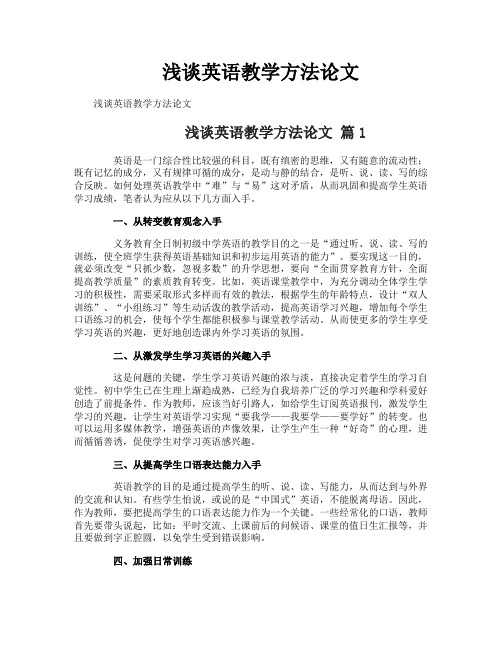
浅谈英语教学方法论文浅谈英语教学方法论文浅谈英语教学方法论文篇1英语是一门综合性比较强的科目,既有缜密的思维,又有随意的流动性;既有记忆的成分,又有规律可循的成分,是动与静的结合,是听、说、读、写的综合反映。
如何处理英语教学中“难”与“易”这对矛盾,从而巩固和提高学生英语学习成绩,笔者认为应从以下几方面入手。
一、从转变教育观念入手义务教育全日制初级中学英语的教学目的之一是“通过听、说、读、写的训练,使全班学生获得英语基础知识和初步运用英语的能力”。
要实现这一目的,就必须改变“只抓少数,忽视多数”的升学思想,要向“全面贯穿教育方针,全面提高教学质量”的素质教育转变。
比如,英语课堂教学中,为充分调动全体学生学习的积极性,需要采取形式多样而有效的教法,根据学生的年龄特点,设计“双人训练”、“小组练习”等生动活泼的教学活动,提高英语学习兴趣,增加每个学生口语练习的机会,使每个学生都能积极参与课堂教学活动。
从而使更多的学生享受学习英语的兴趣,更好地创造课内外学习英语的氛围。
二、从激发学生学习英语的兴趣入手这是问题的关键,学生学习英语兴趣的浓与淡,直接决定着学生的学习自觉性。
初中学生已在生理上渐趋成熟,已经为自我培养广泛的学习兴趣和学科爱好创造了前提条件。
作为教师,应该当好引路人,如给学生订阅英语报刊,激发学生学习的兴趣,让学生对英语学习实现“要我学——我要学——要学好”的转变。
也可以运用多媒体教学,增强英语的声像效果,让学生产生一种“好奇”的心理,进而循循善诱,促使学生对学习英语感兴趣。
三、从提高学生口语表达能力入手英语教学的目的是通过提高学生的听、说、读、写能力,从而达到与外界的交流和认知。
有些学生怕说,或说的是“中国式”英语,不能脱离母语。
因此,作为教师,要把提高学生的口语表达能力作为一个关键。
一些经常化的口语,教师首先要带头说起,比如:平时交流、上课前后的问候语、课堂的值日生汇报等,并且要做到字正腔圆,以免学生受到错误影响。
初中英语教学优秀论文3篇

初中英语教学优秀论文3篇
论文1:提高初中英语教学质量的有效策略
这篇论文探讨了提高初中英语教学质量的有效策略。
作者首先分析了初中英语教学存在的问题,如学生研究动力不足、教材内容单一等。
接着,作者提出了一些行之有效的策略,包括鼓励互动式研究、提供个性化辅导等。
最后,作者通过实践案例证明了这些策略的有效性。
论文2:提高初中英语口语能力的教学方法研究
本文旨在研究提高初中学生英语口语能力的教学方法。
作者通过对现有教学方法的分析和评估,提出了一种以情景教学为基础的方法。
该方法通过创造真实的语境,促使学生主动参与口语表达。
实证研究表明,该方法可以有效提高学生的口语能力。
论文3:初中英语课堂互动教学的实施策略
这篇论文介绍了初中英语课堂互动教学的实施策略。
作者提出了一套可行的策略,包括采用小组活动、引入多媒体资源等。
通过实际教学案例的分析,作者证明了这些策略能够激发学生的研究兴趣,提高课堂互动效果。
以上是三篇关于初中英语教学的优秀论文的简要介绍,希望对您有所帮助。
如需详细内容,请查阅相关文献。
- 1、下载文档前请自行甄别文档内容的完整性,平台不提供额外的编辑、内容补充、找答案等附加服务。
- 2、"仅部分预览"的文档,不可在线预览部分如存在完整性等问题,可反馈申请退款(可完整预览的文档不适用该条件!)。
- 3、如文档侵犯您的权益,请联系客服反馈,我们会尽快为您处理(人工客服工作时间:9:00-18:30)。
The Analyses of English Game T eaching In Primary SchoolsRecently, using games in English teaching has become a popular technique exercised by many teachers in the classrooms and recommended by methodologists. And it can be proved that playing game in English is one of the effective ways in English study and it is suitable for the development of pupils' physiological characteristics. In the following paragraphs I will give analyses of the English game teaching in primary schools.1.Why teachers use games in English teachingThe game is children's nature. For children, the game is to live, and the life is a game, Playing games can foster children's abilities, such as their intelligence, perception and so on. Many scholars agree that games in the language classroom have been considered a better way to encourage children to work hard and cultivate their interest in clearing English. Children enjoy playing games in their native and this is a familiar experience for children to be introduced to study a foreign language.While the importance of interest embodied sufficiently.Interest is a kind of power what can drive people to learn actively and happily. And interest makes learning more effective and efficient. There is a saying says "interest is the best teacher". It also means that you will learn better if you are interested in it. So, how to arouse students' interest to study is a very important and critical problem for a teacher to consider and solve.In learning English, it is very important to motivate and develop the students' interest. Interest is not with the baby when it was born. It grows with each passing day. For those preparatory students who have just entered primary school, how to arouse the interest of the students' is a new subject before teachers. Most of them are afraid of learning English, especially reciting texts, remembering lots of new words and expression. This will make resistance for them to study English. We can’t make it a condition that students can recite howmany new words and texts to measure the standard of learning English. We should develop the students' interest of studying English. As interest is a source, interest is a motive power of study; it can make students sustain a long time to study English. So interest is one of the key elements. Teachers have to create a healthy balance between preparing students for the standardized exams and for life-long language skills. One solution is to develop a continuous program, which includes an integrated in-class, and out-of-class language activities that help to nurture student language skill. In our primary school students are usually lacking in atmosphere of learning English. But they are lively, and they have wide interests. They are eager to show themselves. To take the advantage of educational method of physiology and psychology, we should make use of the characteristic of the primary school students.2. The advantages of using games in language teachingAs we know, language learning is not easy work. Games can help and encourage many learners to sustain their interest. They play an important role in language teaching. They provide insights into the benefits of games in the classroom. Many scholars point out the advantage of games in language teaching:a. Games are a welcome break from the usual routine of the language class.b. They are motivating and challenging.c. Learning a language requires a great deal of effort. Games help students to make and sustain the effort of leaning.d. Games provide language practice in the various skills-speaking, writing, listening and reading.e. They encourage students to interact and communicate.f. They create a meaningful context for language use.As for ESL(English as a second language)teachers.they should consider the advantages of games: the ability to capture student's attention; lower students' stress; and give students the chance for real communication.3. How to choose gamesWhen choosing a game, the teacher should be careful to find an appropriate one for the class in terms of language and type of participation. There are a great number of language games. So teachers have a variety of choices. However, in deciding which game to use in a particular class and which games will be most appropriate and most successful with their students, teachers must take many factors into account.Teachers should first consider the level of the game to fit their students' language level. They should choose the game that fits the purposes of that class or the content. Moreover, teachers should consider students' characteristics: whether they are old or young, serious- minded or light-hearted, and highly motivated to learn or not. They should also consider when the game should be used because there is a big difference between using the game in the morning or in the afternoon, on Monday or Friday.In addition to the factors mentioned, teachers should also be able to play and overact sometimes to help students feel comfortable and want to join the activity. This means teachers should thoroughly understand the game and its nature and be able to lead the game.It is quite difficult to find a game that meets all of the teachers’requirements. Some games must be adapted in order to fit students’ language level, natures and characteristics. The most important factor is that games should be used when they can give students both fun and educational meaning otherwise they will be a waste of time.4. When to use gamesGames are often used as short warm-up activities or when there is some time left at the end of a lesson. A game “should not be regarded as a marginal activity filling in odd moments when the teacher and class have nothing better to do”. Games ought to be at the heart ofteaching foreign languages. At different stages of the lesson, the teachers' aims connected with a game may vary:Presentation. Provide a good model making its meaning clear.Controlled practice. Elicit good imitation of new language and appropriate responses. Communicative practice. Give students a chance to use the language.Games also lend themselves well to revision exercises helping learners recall material in a pleasant, entertaining way. All authors referred to in this article agree that even if games resulted only in noise and entertained students, they are still worth paying attention to and implementing in the classroom since they motivate learners, promote communicative competence, and generate fluency.5. Clear rules and time limitationUnless the learners know what they are wanted to do and how to do it, the aim cannot be achieved and the game cannot be played, so the teachers should give clear rules as many as possible.However, rules are always difficult to negotiate. That is why most teachers carefully plan the rules for the games they wish to play. But although rules are carefully planned it seems to be universal that students love breaking some of them while playing. This breaking of the rules can also turn out to be extremely dangerous and/or harmful to the environment in the class for it may cause quarrels. Students must be very aware of the importance of the rules of the games they are playing and there must be a kind of honor code or ground rules that participants must follow while playing. The understanding of rules makes 70% of a successful activity.Time limitation is important. What makes the game interesting or boring depends on time. If a student spends a lot of time answering a question then the other students become bored and lose their interests. And when they become bored, as the old say ing goes, “The devil findswork for idle hands.” There are no stable and fast rules to set time limits. They depend on the ability of the student and the difficulty of what the teacher is trying to teach.6. ConclusionGenerally speaking, as a teacher, he should make his teaching interesting and living. He should use various methods to arouse the pupils' interest in learning and make them learn knowledge as lively as possible. Only in this way, can he teach the pupils well. The pupils can also achieve better results. In short, playing games in teaching is both very useful and important, and it is a good method of teaching which can be used and developed.To sum up, playing games is one of useful activities which are liked by children very much. If an English teacher can play games in the course of English teaching, children's enthusiasm will be aroused, classroom's atmosphere will be stimulated and teaching effectiveness will be improved.。
